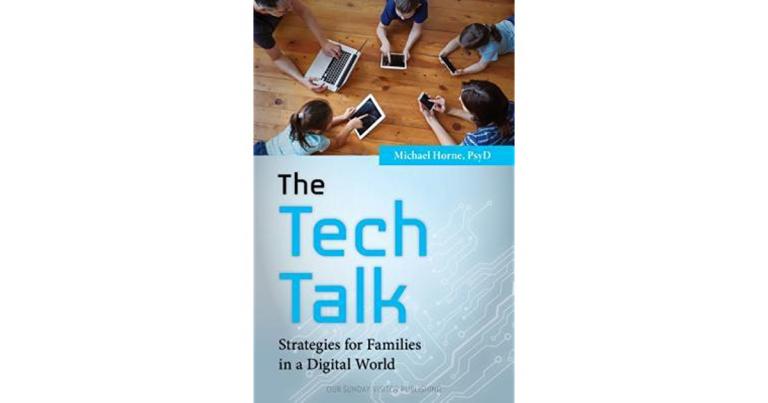 Michael Horne provides an excellent primer on all the dangers for kids regarding technology in The Tech Talk but he spends scant time showing the good side that can be there.
Michael Horne provides an excellent primer on all the dangers for kids regarding technology in The Tech Talk but he spends scant time showing the good side that can be there.
Almost a year ago, I was on an EWTN panel with Dr. Michael Horne, PsyD. He mentioned a soon-to-be-published book he wrote on kids and technology – I noted I might be interested in reviewing it. OSV published it in Fall 2017 and sent me free copy, but it sat on my shelf till recently.
I’m torn to rate this book as a home run or a solid base hit. I think it depends on what you view as his goal. If his goal was to warn parents of the dangers of technology and not just assume giving every technology to their kid, it’s a home run. If you saw a wider goal as I expected the book to cover, it’s a solid base hit. I expected two things the book came up a little short on. First, more on how kids can use technology in positive ways. Second, given the name was “The Tech Talk” I was expecting more tools for the best ways to bring it up with kids.
All the Dangers of Technology
Since Horne is so good in explaining the dangers for kids in technology, I’m just going to summarize him.
First Chapters
His first chapter focuses on how technology permeates the culture and can create an unhealthy point for kids. He notes how we have a combination of two things that can be problematic when combined. First, smartphones permeate the play even of the youngest kids. Second, children believe whatever they grow up with is normal, even if it is ridiculous. For this latter, he gives the example of a kid who thought cookies only baked right if you were quiet: evidently his mom had convinced him so he’d be quiet from time to time.
The next chapter spends some time exploring how kids develop and how technology can alter that. He uses Erickson’s stages of development (you can read about them here). Then he notes how any game puts certain restrictions on 5-year-olds’ play not found a cardboard box or similar. “Video games, even those with the most successful digital worlds, are limited in their ability to match the free play of a group of five-year-olds. This holds true even for those ‘sandbox games’ which kids are free to interact with the world in whatever way they want, I’m constrained by a need to do things in this specific way or order.” (33) Here I wonder a bit because I see very little difference in the restrictions my nephews would have playing Lego vs playing Minecraft. (I’m not saying there are not differences but simply they are not completely obvious.)
Social Media
He then moves on to social media. He begins by defining it: “Electronic interactions among people in which they create, share, and exchange ideas in virtual communities and networks.” (41) Then explains the extraordinary effort teens often undergo for likes or other essentially meaningless social media feedback.
He continues on this thread, noting Evan Selinger suggested in 2013 that social-media-only-relationships are unstable as they disappear once something becomes more convenient or fun. This is true at times. I have noticed people who interact regularly with me on Twitter then I don’t hear from them for 6 months. I wonder how different this is from other forums though? For example, I was decent friends with many I studied with while studying but now I keep up with few of them. I fully understand that this can be problematic – as he mentions with a teen who was depressed because he was addicted to social media – and think Dr. Horne is right to point out these dangers.
Video Games
Regarding video games, he tries to inform parents as they are often unfamiliar with the rating system. Many parents don’t realize an M game is like an R movie but possibly worse as you often control the violence. He notes how even the US government used Doom to train Marines. I grew up playing Doom but in hindsight realize how it could have affected a person with a different disposition. I played against a friend via 14.4 modem and we had as much fun making new levels as playing the game. (Some of my levels became quite popular downloads on AOL [yes, AOL].) The fact that this game helps people be better Marines kind of undermines his argument elsewhere that games teach no job skills – being a Marine is not for everyone but that is an honorable job.
He does note how games can be positive. Noting how certain games can help strengthen existing relationships. He does note how playing with kids from their school is different from playing random strangers online as the latter might be characters we’d never let kids play offline with. He notes a certain danger of freemium games becoming a new form of status symbol as rich kids can pay to level up while others need to work 10x harder. However, I don’t see it that different from the status by clothes which most of us dealt with. I remember asking my mom to buy the cool brand of jeans but she bought me store brand jeans, which definitely didn’t boost my social status.
Pornography and Issues with Chastity
Then he has some chapters on porn and chastity in general which are a decent summary although several have dealt with these – such as Matt Fraud’s Porn Myth – but Horne provides a decent summary.
The last few chapters get into what makes for a healthy family and how technology can interfere with this. He has some valuable truths like, “The first key element is unconditional love. This must be present among all family members, but is most vital in the relationship of parents with their children. Unconditional love means that we love and accept our children for who they are. This can be challenging in many ways.” (98)
His main recommendation in the family section is to do a week-long family technology fast and discuss it. I know that a technology fast is helpful – I do it together with my annual week-long retreat each year and it reminds me of what is valuable to do on technology and what’s a waste of time. However, this section has little on suggestions for using technology in healthy ways.
What is Good and True in Technology
Horne mentions positive things with technology in passing but really doesn’t talk about how to direct kids in that direction. I was a computer nerd – maybe “I am” is a better phrasing. When I had a personal experience of Jesus in high school, I returned to my parish and found nobody my age on fire. I couldn’t find one person between 12 and 22 really excited about their faith. Protestantism tempted me, and I almost joined as I saw some on-fire teens. Fortunately, I decided to check out Catholicism online first before leaving it. There I found a strong Catholic community and would post almost daily on different online Catholic discussions forms. When I left for the seminary 3.5 years later, I was one of the top-5 posters of all time on the now defunct OneRock Catholic teen e-zine.
Today, with so much time online, part of teens evangelizing and helping other teens should probably be online too. Take Catholic Teen Posts on Instagram for instance – although you may or may not agree with every post, she is clearly a model of positive social media use by a teen.
Technology is by nature good and we need to help people see that not just note all the dangers. Horne vaguely mentions this from time to time in passing but overall the books seems to take emphasize the dangers.
Overall, it is an excellent summary of the dangers that technology brings into kids’ and teens’ lives and if you’re looking for that it’s 5 stars. However, I only give it 4 stars for not giving a bit more on the positive or ideas on how to talk about it with kids.












